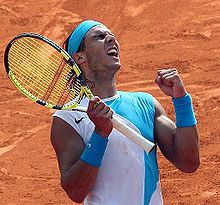Babolat
This article has multiple issues. Please help improve it or discuss these issues on the talk page. (Learn how and when to remove these messages)
|
| Industry | Sports equipment |
|---|---|
| Founded | 1875 |
| Founder | Pierre Babolat |
| Headquarters | Lyon, France |
Key people | Éric Babolat (CEO) |
| Products | Racquets, strings, accessories and shoes |
| Revenue | €141.2 million (2014) |
Number of employees | 369 |
| Website | babolat.com |
Babolat (/ˈbɑːboʊlɑː/) is a French tennis, badminton, and padel equipment company, headquartered in Lyon, best known for its strings and tennis racquets which are used by professional and recreational players worldwide. The company has made strings since 1875, when Pierre Babolat created the first strings made of natural gut. Babolat continued to focus on strings until 1994, when it became a "total tennis" company, producing also racquet frames and selling them in Europe. It then expanded sales to Japan, and later to the United States in 2000. Sales of Babolat racquets increased rapidly in North America and Europe. Babolat is also a pioneer in connected sport technology and launched a connected tennis racket in 2014[1] and a connected wrist-worn tennis wearable with PIQ in 2015.[2] The Babolat Pop is one of the leaders in tennis sensors worldwide.
Notable products
[edit]Strings
[edit]Some of the strings produced by Babolat include RPM Blast, one of the most popular polyester strings known for its spin potential, and VS Gut, a leading and original natural gut string.
Racquets
[edit]Babolat's current tennis racquet line-up includes Pure Drive, a power-oriented racquet used by players such as Carlos Moyá, Kim Clijsters, Andy Roddick and Li Na, Pure Aero (formerly AeroPro Drive), known for its spin potential and usage by Rafael Nadal, Caroline Wozniacki and Carlos Alcaraz, and Pure Strike, a control-oriented racquet used by players such as Dominic Thiem.
Sponsorships
[edit]
Some of Babolat's sponsored players include:[3]
Tennis
[edit]Men
[edit] Federico Delbonis
Federico Delbonis Jordan Thompson
Jordan Thompson Félix Auger-Aliassime
Félix Auger-Aliassime Holger Rune
Holger Rune Carlos Alcaraz
Carlos Alcaraz Albert Ramos Viñolas
Albert Ramos Viñolas Arthur Fils
Arthur Fils Stéphane Houdet
Stéphane Houdet Benoît Paire
Benoît Paire Giovanni Mpetshi Perricard
Giovanni Mpetshi Perricard Cameron Norrie
Cameron Norrie Luke Watson
Luke Watson Fabio Fognini
Fabio Fognini Taro Daniel
Taro Daniel Yosuke Watanuki
Yosuke Watanuki Alexander Shevchenko
Alexander Shevchenko Evgeny Donskoy
Evgeny Donskoy Elias Ymer
Elias Ymer Mikael Ymer
Mikael Ymer Maxime Cressy
Maxime Cressy Ryan Harrison
Ryan Harrison Sam Querrey
Sam Querrey
Women
[edit]Retired players
[edit] Mariano Puerta
Mariano Puerta Samuel Groth
Samuel Groth Dominic Thiem
Dominic Thiem Kim Clijsters
Kim Clijsters Kirsten Flipkens
Kirsten Flipkens Fernando González
Fernando González Li Na
Li Na Peng Shuai
Peng Shuai Mirjana Lučić-Baroni
Mirjana Lučić-Baroni Kristýna Plíšková
Kristýna Plíšková Carlos Moyá
Carlos Moyá Garbiñe Muguruza
Garbiñe Muguruza Rafael Nadal
Rafael Nadal Anett Kontaveit
Anett Kontaveit Alizé Cornet
Alizé Cornet Pauline Parmentier
Pauline Parmentier Jo-Wilfried Tsonga
Jo-Wilfried Tsonga Johanna Konta
Johanna Konta Julia Görges
Julia Görges Francesca Schiavone
Francesca Schiavone Yūichi Sugita
Yūichi Sugita Agnieszka Radwańska
Agnieszka Radwańska Nadia Petrova
Nadia Petrova Dinara Safina
Dinara Safina Elena Vesnina
Elena Vesnina Viktor Troicki
Viktor Troicki Timea Bacsinszky
Timea Bacsinszky Dominika Cibulková
Dominika Cibulková CiCi Bellis
CiCi Bellis Jack Sock
Jack Sock
Badminton
[edit]Men
[edit]Women
[edit]Controversy
[edit]Despite initial statements indicating a cessation of business with Russia following the 2022 Russian invasion of Ukraine, Babolat products remain available in the country. According to research from the Yale School of Management, Babolat’s operations in Russia are conducted through an independent distributor, with whom Babolat has reportedly ceased direct transactions. However, this distributor continues to sell Babolat products and identifies as a Babolat-affiliated distributor.[4][5]
References
[edit]- ^ Kiss, Jemima (2015-05-04). "Tennis just got smarter with the Babolat Play connected racket - review". the Guardian. Archived from the original on 2015-05-26. Retrieved 2021-05-11.
- ^ Palermo, Philip (2015-08-28). "Babolat and PIQ team up for a pair of wrist-worn tennis wearables". Engadget. Archived from the original on 2020-11-08. Retrieved 2021-05-11.
- ^ "Babolat Players Sponsored". babolat.co.uk. Babolat. Retrieved Jun 12, 2020.
- ^ Shehadi, Sebastian (2023-07-25). "WeWork, Nestle and Babolat among the Western companies who reneged on promises to leave Russia". Investment Monitor. Retrieved 2024-12-05.
- ^ Tian, Jeffrey Sonnenfeld,Steven. "'The Feckless 400': These companies are still doing business in Russia–and funding Putin's war". Fortune. Retrieved 2024-12-05.
{{cite web}}: CS1 maint: multiple names: authors list (link)
